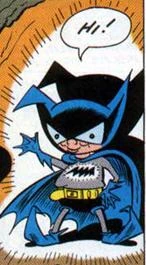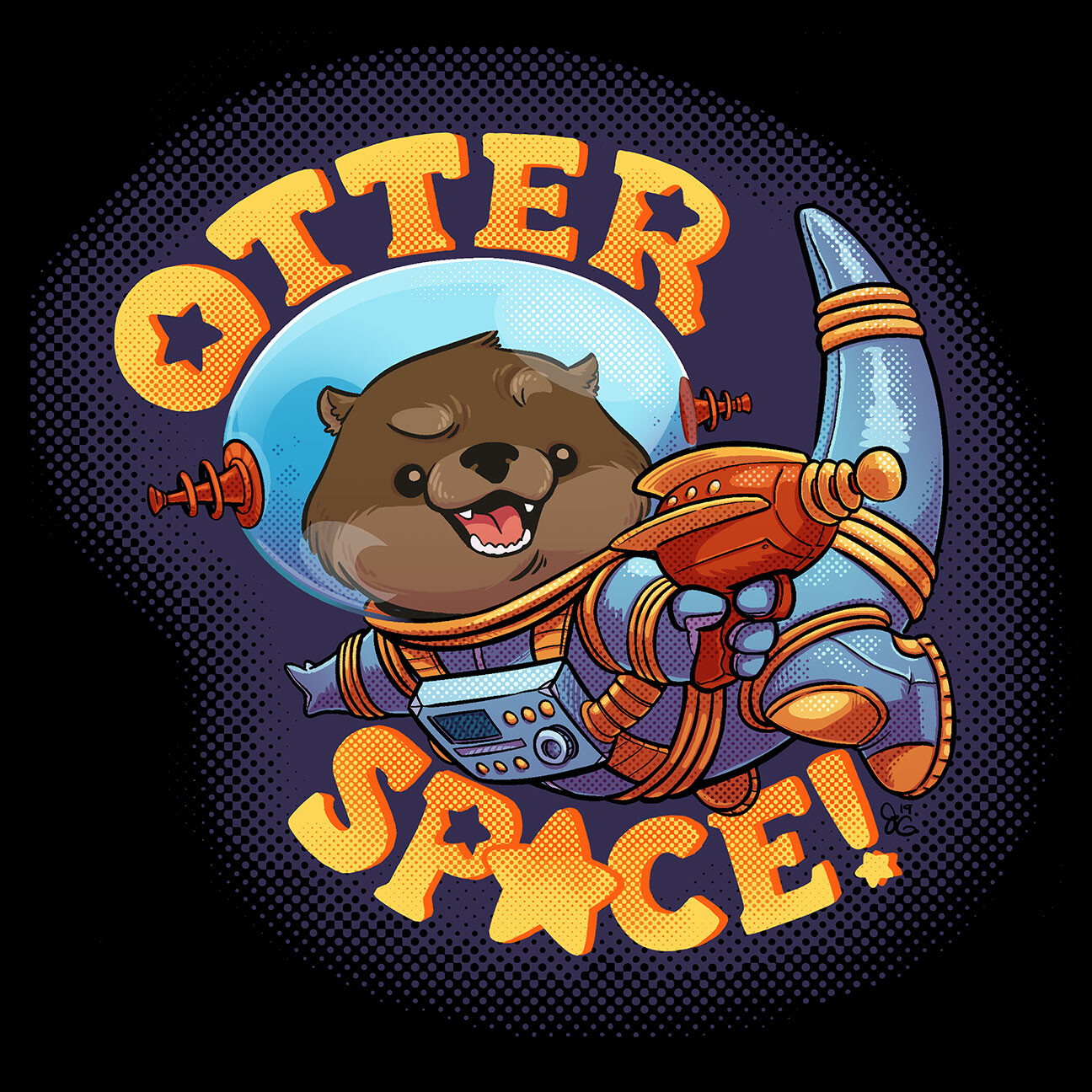Fantasy is when there’s magic, sci-fi is when the magic has specific terminology.
But what if there’s bats? Bats typically aren’t on the floor!
If it’s on the ceiling, it’s a Bat-Cite and if it’s on the floor, it’s a Bat-Mite.
spoiler
Pictured: Bat-Mite

Bats on the floor are obviously Rats, because the bottom of the B is obscured by the puddle they’re standing on.
Bats are just rats with wings
Why does this analogy make sense to me for some reason?
Because in the classical Jungian style of analysis, imagery of the basement of a childhood home was a revisiting of the past.
Likewise “up from the floor” indicates ancients coming up from caves, ancient monsters to be slain, underground dungeons. The primitive unchained and revisited.
…and using Freud’s principle of the inversion; down from the ceiling is indicative of from the future.
Prometheanism, featuring stories of Science only taking us so far before we fall from the ceiling, or rather it chaotically falls on us.
The idea that a return to primative barbarism and violence can also come from above, from technology, from the future unknown, from advanced beings, complex plans, or outter space.
So whether it’s up from the floor (ancient past) or down from the ceiling (unknown future) - it’s coming for us, with risks and dangers we’re not ready for…
…or so the stories go.
I, too, love stories of otter space.

Omg I wanna go there now
Probably the drugs
Can I have some of those drugs please?
I believe I am currently on those drugs! To me, this means that sci-fi is usually written starting from the universe and then focuses down to the individual, but fantasy is written from the individual up to the world. Sci-fi has more of a universe building focus and fantasy has more of a personal and character development focus.
Fantasy is almost alway low-tech, Sci-fi is almost always high-tech. As such, fantasy tech levels could be compared to starting low and going high, while sci-fi starts high and then goes low as it tries to explain the concepts it’s introducing.
I can’t tell if she’s making an analogy, or merely making a joke about remembering the difference between two similar things. Stalactites form on the ceiling of a cave, while stalag_mites_ form on the floor.
Star Trek says, “Eat me and my 58 years of series and films— Ad astra per aspera!”
Lmao
Enders Game instilled the importance of adjusting your frame of reference. What was up can become down.
So it’s science fiction but when you consider a collaborative global human response to existential danger it’s fantasy.
But the Shadow series shows how quickly we go back to weaponizing and using gifted war trained children as tools of conquest… so realism/horror?
Orson Scott Card actually weighed in on a simple way to determine if something is fantasy or sci-fi since he writes both:
The difference between science fiction and fantasy…is simply this, science fiction has rivets, fantasy has trees.
Am I the only one that is seeing this as a joke referencing Stalactites and Stalagmites? Like I also think that it fits as a good thought experiment, but is the joke so obvious that no one is stating it? Or is am I just reading something into it that’s not there?
I’ve only read your comment so far, but I thought it was obvious enough to be surprised your comment was in top
Stalactites hold tightly to the ceiling.
Yeah not obvious to me at all. I came to the comments to get enlightened because I did not get the joke.
I honestly thought “that can’t possibly be the joke, right?” because it seems pretty nonsequitur.
You seem to be one of the few commenting so far.
The joke is so obvious there’s no need to comment on it so others, including myself, are using this as an opportunity to post our opinions on the difference between sci-fi and fantasy.
I used to get them confused until a visit to Luray Cavern. The tour guide explained that one “held ‘tite’ to the ceiling while the other just ‘mite’ reach it.”
They look like:
T
M
It’s easier than that: c for ceiling, g for ground.
I just remember it intuitively based on vibes. Stalagmites sound bulky and lumpy, and stalactites sound sharp and light.
I always liked the distinction (I forget who originated it) that science fiction is a story set in a world where the rules are defined by physics and fantasy is a story set in a world where the rules are defined by the author.
Star Wars is fucked…
Oh, it’s fantasy
Star Wars is absolutely fantasy that happens to be set in space
Dune is more fantasy than Star Wars and many consider it one of the best sci-fi of all times.
I personally subscribe to Asimov’s definition of sci fi:
Science fiction can be defined as that branch of literature which deals with the reaction of human beings to changes in science and technology.
While Dune is full of stuff that’s just straight up magic, the story is very much about how humans handle the technology, even when the in-universe basis of the technology is essentially magic. Long before the story ever started, we invented AI, freaked out about it, and then had to figure out how to replace computers in an interstellar society. The main overarching plot of the kwisatz haderach is about the consequences of the “invention” of precognition, even if the means of the invention are very fantastical. Several major factions are basically “what if we did super advanced selective breeding on humans for a thousand years”.
Star Wars, meanwhile, isn’t concerned with that sort of thing. It’s an adventure of good againt evil in the most classic of ways. It’s sword and sorcery. Even when a literal world-destroying superweapon is a major plot point, it doesn’t actually take much of any time to think about what this technology would do to society beyond “be very scary”. The obvious point of comparison is nuclear weapons in real life, and the development of those re-shaped culture enormously. We suddenly had this craze of imagination of all the things nuclear power might do. Humanity conquered the atom and we couldn’t stop dreaming up new ways to wield this power. Most of which were fucking insane. In Star Wars, a power orders of magnitude greater shapes society no more than a particularly big army.
Star Wars is only interested in the characters, whatever technology is present is set dressing to allow for fun visuals. That’s not something I say as a negative either. It’s perfectly valid and reasonable for a story to take more interest in its characters than its setting.
Disclaimer: I’m writing all this thinking only about the nine main series films. Especialy the original three. I’m sure someone has written Asimov-definition sci fi somewhere in the Star Wars canon, “legends” or not. I’ve just never delved into it much at all.
Star Wars, meanwhile, isn’t concerned with that sort of thing. It’s an adventure of good againt evil in the most classic of ways. It’s sword and sorcery.
Lightsaber and Forcery
I don’t know if you’re brave or foolish, but either way, vaya con dios. The Star Wars fans are relentless.
I also think that the Last Jedi is one of the better Star Wars films, so I’m quite used to my Star Wars opinions being the subject of definitely very polite disagreement
I can only speak for myself, but as a Star Wars fan, I’m very aware it’s fantasy. Shit man, it’s got wizards.
All I know is that a lot of Star Wars fans accept convoluted explanations for what Han Solo could have meant by doing the Kessel Run in under 12 Parsecs rather than accept that he just meant “ship go very fast.” And at the same time not be concerned with how there could be the concept of a falcon a long time ago in a galaxy far, far away.
The people who hate star wars the most are themselves the biggest fans of star wars.
There’s a lot of science fiction where the rules of the world are defined by the author. I think the difference is that the foundation of science fiction is on what the world is, both literally, and metaphorically, while the foundation of fantasy lies upon what the world could be, hence the name fantasy
The point is that if the rules aren’t grounded in science, it’s not science fiction. You can have the trappings of science, like space travel or whatever, but if people are moving objects and doing impossible acrobatics by using a magical force, it’s fantasy.
Though not mine, I personally think that definition works better than most. Still, if you pin me down, I’d say that there’s a spectrum, with hard SF (where everything is rigorously anchored to scientific principles) at one end, and pure fantasy (with magic and such) at the other. There are lots of things between those endpoints, with some being closer to one or the other, and some being very much in the middle.
What was it again in science fiction, hard and soft? Whereas hard is more realistic and soft has more fantasy.
Fantasy is right-leaning while SF is left-leaning. Easy peasy.
I would argue that science fiction and fantasy are the same thing and the only difference is the explanation for how all the cool stuff works.
Functionally, there’s no real difference between a portal that takes the characters to another world using a wormhole and one that does it through through magic. Just like how there’s no difference between Vulcans/Klingons/Wookies and Elves/Dwarves/Beastmen. Both are intelligent non-humans.
There are disappointingly few epic space battles in fantasy though.
just like IRL trees and computer science trees!
science fiction is in space and fantasy has castles.
I will take no further questions.
Counter point Star Wars. Magic powers, magic swords, rescuing princesses, chosen one prophesies.
as the other commenter said, there’s very little science fiction in star wars. It’s more fantastical creatures and magic and shit. it’s actually fantasy. Star trek however, that’s scify
Vader even has a castle
Star Wars is 100% a Space Fantasy. A boy goes on an adventure accompanied by a wizard to save a princess and become a knight.
I’ve been reading stories from the Hatsune Miku rhythm game app, that almost straddles the line between urban fantasy and unexplained sci-fi. The premise is that instances of the vocaloids live in personalized virtual worlds for different (small) groups of humans. The humans can teleport to these worlds by playing a special song on their phone, or the vocaloids can project themselves as holograms from the humans’ phones. It’s almost sci-fi because it mostly works within constraints of technology. For example, you get booted out of the virtual world if your phone runs out of battery, and if your phone gets shorted out, it can prevent the vocaloids from projecting themselves until the phone is repaired (though if the phone still works otherwise, they can voice chat.) Also the special song can be transferred to different machines and still works. But then what makes it more fantasy is that the song and worlds are created from the humans’ feelings (and if they lose the song, a new copy will appear for them,) and it works without internet connection (if one member of a group is stranded and another isn’t, they could have a vocaloid relay a message.) And then just recently I read a chapter where some characters were able to access their virtual world through their dreams, without needing the song file in the first place. For me, that’s what completely tipped the scale into urban fantasy.
Wow. Thank you for typing that up! What an amazing mind the author has to come up with something so uniquely different, at least that I’ve read or heard of.
I don’t know who writes it, and I wouldn’t exactly call it a masterpiece (though to be fair, I am reading translations,) but it is a fun premise. I started reading it because it’s one of the few sources of official Hatsune Miku lore (though ultimately everything is canon,) but the stories focus more on the human characters, with the vocaloids mostly just being there to support. Still, the stories can be compelling.
At this point, half the reason I’m still reading is for the human characters, and the other half is to find details on the premise, such as how it works with thermodynamics, whether the cafe world has an economy, how biological the vocaloids are (do they need to eat?), and how long it’s going to be before anyone finds out that their bestie/sibling/trainer/etc has their own virtual world too (they don’t do a great job of keeping it secret, but they also don’t do a great job of investigating.)
Fantasy evolved out of folk tales in the public domain. It was owned by nobody, and everyone could add to the story. It’d be accepted if people thought the story was good enough. Later, new stories were under copyright, but their heritage was clearly public.
SF grew up when a strong copyright regime was already in place. It was owned by either a single person or a corporation, and only they had the legal right to declare what was canon or not.
Science fiction is used to look down upon society and is often pessimistic. Fantasy look ls up at what could be and is generally optimistic.























